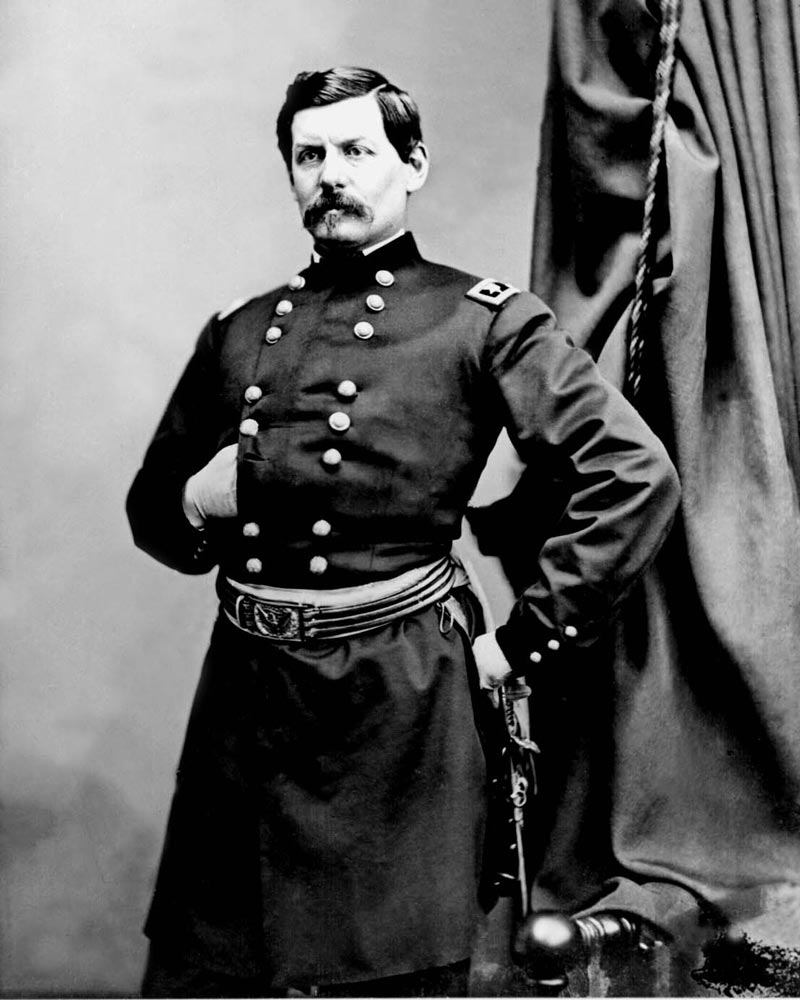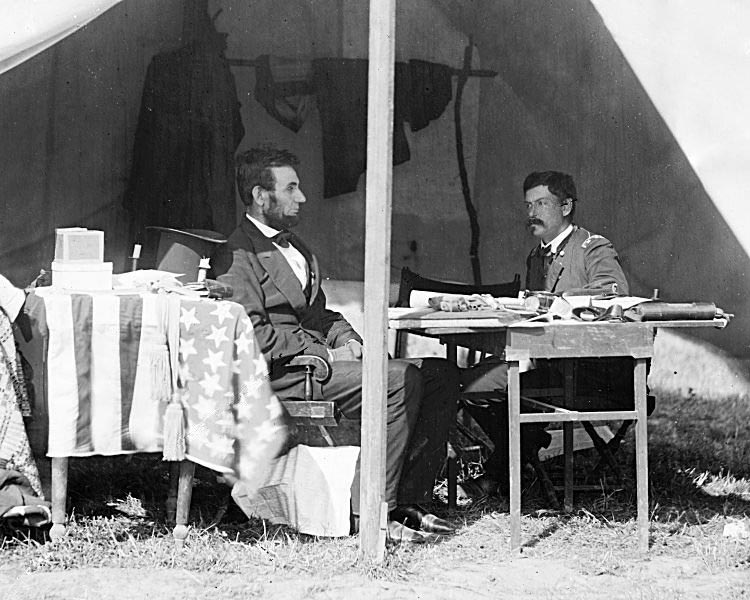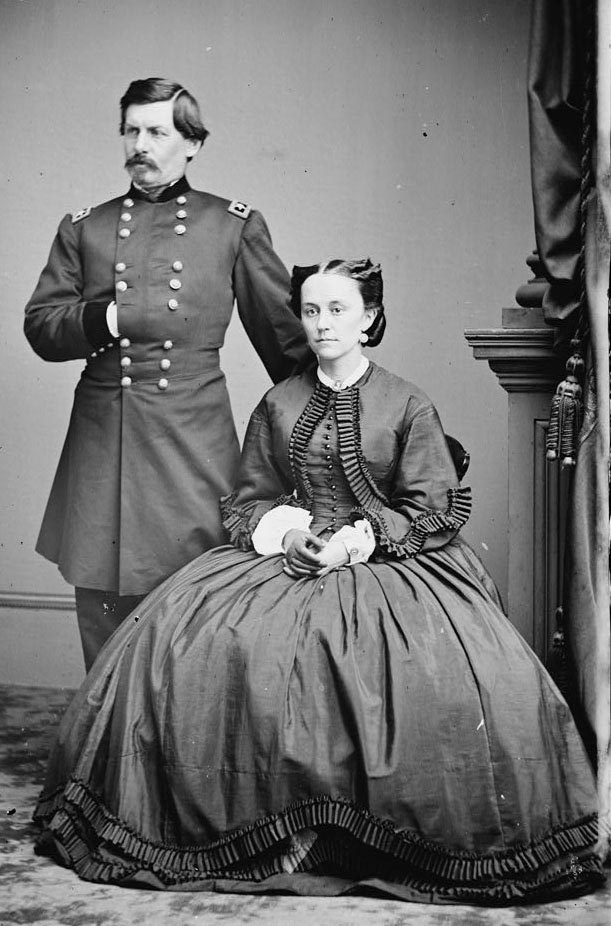| George B. McClellan | |
|---|---|
 |
|
| Born | George Brinton McClellan Dec. 3, 1826 Philadelphia, Pennsylvania |
| Died | Oct. 29, 1885 (at age 58) Orange, New Jersey |
| Allegiance | United States of America Union |
| Rank | Major General (1846–1857, 1861–1864) |
| Battles/wars | Mexican–American War American Civil War Battle of Rich Mountain Peninsula Campaign Seven Days Battles Maryland Campaign Battle of Antietam |
George B. McClellan (1826-1885) was an American soldier and politician, best known for his service in the American Civil War, where he was a major general in the Union Army. He was very popular with his men, despite having a number of serious shortcomings as a commander. In particular, he was often slow to commit his forces even when numbers were in their favor. McClellan ran for the Presidency of the United States in 1864 but was badly beaten by Abraham Lincoln, the incumbent.
Early Life
A son of Philadelphia and one of five children, McClellan was born into a medical family: his father was a renowned ophthalmologist who set up Jefferson Medical College. He also had some military background, since his grandfather, Samuel McClellan, who had been a general in the War of Independence. George himself decided to become a lawyer and to that end enrolled at the University of Pennsylvania in 1840; he was just thirteen years old at the time. Two years later, however, he changed his mind and resolved to enter the military. His father’s influence with President John Taylor helped to get McClellan accepted into the U.S. Military Academy at West Point, despite being a year below the usual entry age of sixteen.
McClellan proved an active student at West Point, and the young cadet showed himself to be particularly interested in the principles of strategy. While at the Academy, McClellan made friends with several cadets from upper-class Southern families, something which he later felt to be an advantage, in that it allowed him to gain a greater appreciation of the military, political, and social differences between North and South that were the catalysts for the Civil War. McClellan graduated from West Point in 1846 second in his class. Only his indifferent skills at drawing kept him from top place.
 Made a brevet second lieutenant in the Corps of Engineers, McClellan’s first significant military experience was in the Mexican-American War. Sent to the Rio Grande in 1846, he was disappointed to have been too late to fight at the Battle of Monterrey. It was at this time that McClellan suffered the first of what were to be repeated bouts of malaria, and he was hospitalized for several weeks. Although his bravery won him brevet promotions to first lieutenant and then captain, McClellan became somewhat disillusioned with the glacial pace of promotion in the regular ranks. He became a fierce advocate for discipline, especially in terms of respect toward civilians, while he also noted his effectiveness of flanking assaults.
Made a brevet second lieutenant in the Corps of Engineers, McClellan’s first significant military experience was in the Mexican-American War. Sent to the Rio Grande in 1846, he was disappointed to have been too late to fight at the Battle of Monterrey. It was at this time that McClellan suffered the first of what were to be repeated bouts of malaria, and he was hospitalized for several weeks. Although his bravery won him brevet promotions to first lieutenant and then captain, McClellan became somewhat disillusioned with the glacial pace of promotion in the regular ranks. He became a fierce advocate for discipline, especially in terms of respect toward civilians, while he also noted his effectiveness of flanking assaults.
A Return to Peace
After the war was over, McClellan controlled a company of engineers which trained cadets at West Point. He was bored by the routine and repetitiveness of the work, though he was active in West Point’s social life. He was sent to Arkansas in the spring of 1852 to take part in an expedition along the Red River, in the hope of discovering its source. His commander, Captain Randolph B. Marcy, named a small stream McClellan’s Creek in his honor. Meanwhile, the press had been told, erroneously, that the entire expeditionary party had been killed by Comanches, so there was general astonishment when they reappeared safe and well in late July.
 Over the next few years, McClellan was kept busy both professionally and personally. In his military capacity, he undertook a survey of land earmarked for the planned transcontinental railroad. He was criticized by Washington governor, Isaac Stevens, for his incomplete and erroneous intelligence regarding snow depth in Cascade Range mountain passes. McClellan refused an order from the governor to give him the logs he had made, probably because he had used them for personal comments. Once back east, McClellan met Ellen Mary Marcy, the woman who was eventually to become his wife – although disapproval from her family meant that the couple was not married until 1860.
Over the next few years, McClellan was kept busy both professionally and personally. In his military capacity, he undertook a survey of land earmarked for the planned transcontinental railroad. He was criticized by Washington governor, Isaac Stevens, for his incomplete and erroneous intelligence regarding snow depth in Cascade Range mountain passes. McClellan refused an order from the governor to give him the logs he had made, probably because he had used them for personal comments. Once back east, McClellan met Ellen Mary Marcy, the woman who was eventually to become his wife – although disapproval from her family meant that the couple was not married until 1860.
Jefferson Davis, at the time U.S. Secretary of War, sent McClellan on a scouting mission to Santo Domingo, and in 1855 he was promoted to captain. His knowledge of French helped him obtain a place as an observer in the Crimean War. In this role, he was present at the Siege of Sevastopol. Once back in America, he wrote a detailed report of the siege, though he failed to spot the significance of the European armies’ use of rifles. He also designed a new type of saddle, which remained in use until the very end of regular horse cavalry regiments in the United States. After resigning his commission in January 1857, McClellan helped run two railroads and in the early 1860s, he went into politics and was active in the Democratic campaign in the election of 1860.
Civil War
After war broke out, McClellan’s early service in the Union Army was relatively successful. He was instrumental in ensuring that the North had an army which was both properly organized and efficiently trained. He was general-in-chief of the U.S. Army for a few months from late 1861 to early 1862 and set up the Army of the Potomac. However, the attention to fine detail which assisted McClellan here proved to be a drawback on the battlefield, where he tended to estimate enemy numbers as much higher than they really were. This allowed enemy commanders who were sufficiently aggressive and quick of thought – in particular, Confederate General Robert E. Lee – to outmaneuver him, something which led directly to the Union defeat in the 1862 Peninsula Campaign.
At Antietam, McClellan succeeded in countering Lee’s planned advance into Maryland, but failed to press home the decisive victory that the North’s numbers suggested should have been theirs. President Abraham Lincoln was unimpressed by McClellan’s performance, eventually removing him from command. McClellan frequently criticized and even defied Lincoln, thereby losing the President’s confidence to the extent that he opposed him, unsuccessfully, in the 1864 Presidential election. Lincoln did, however, accept that McClellan was – even if not a great commander himself – a fine motivator of men.
Aftermath
His poor performance in the election, where his openly anti-war stance clashed with that of the Democratic Party on whose ticket he was running, damaged McClellan considerably, as did his support for negotiations with the South. With the passage of time, his image recovered sufficiently that he was able to serve as the Governor of New Jersey in the late 1870s.
Criticism of his military performance in the Civil War persisted, however, and late in his life, McClellan published works robustly defending the way he had acted, in particular during the Peninsula Campaign. Fort McClellan in Alabama and McClellan Butte in Washington State are named in his honor.